The inside story of how Lancashire responded to the Covid pandemic
and live on Freeview channel 276
For the quartet who would be at the forefront of Lancashire’s response to the pandemic, their memories of the first mundane occasion when they made meaningful reference to coronavirus bear little relation to the maelstrom into which the outbreak subsequently pitched them.
For Lancashire Constabulary's Deputy Chief Constable Terry Woods, it was an innocuous encounter with his son’s headteacher back in February.
Advertisement
Hide AdAdvertisement
Hide Ad“I remember being stood outside and chatting to him about Covid in China. We both said how we hoped that it wouldn’t come over here - but then two weeks later, I was chairing a Gold meeting about it,” Terry recalls.
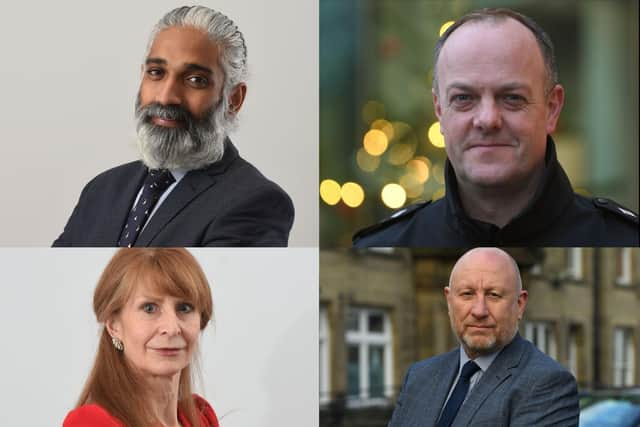

That gathering was the county’s high-level response to the emerging crisis and saw the senior cop installed as the person ultimately responsible for helping to carry Lancashire through the horror that was coming over the horizon - making him the so-called “Gold Command” of an umbrella organisation known as the Lancashire Resilience Forum (LRF).
Lancashire County Council chief executive Angie Ridgwell - who would take over the Gold role during the summer - was neither particularly surprised, nor especially concerned, when Covid very first came to her attention.
“It’s not a vivid memory, which is a bit bizarre considering where we are now - and every year, all of my working life, Public Health England has said there is going to be a mass infection, so you just don’t believe it,” she admits.
Advertisement
Hide AdAdvertisement
Hide AdSadly, that widely-shared sentiment of hope based on past history was about to be shattered with alarming speed - and nowhere more so than here in Lancashire.
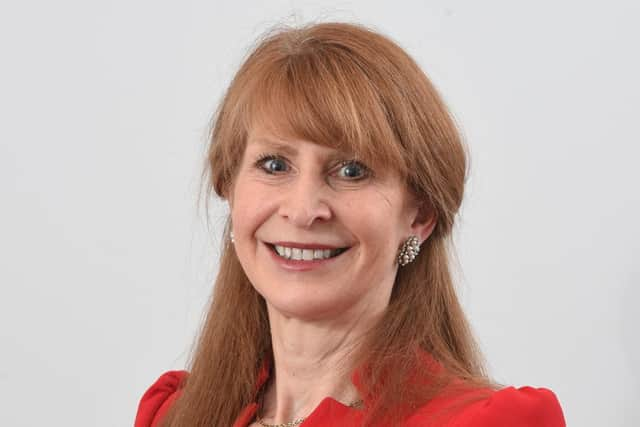

The county’s director of public health, Dr. Sakthi Karunanithi, thought in February that the first Covid cases might arrive in Lancashire by the early summer - but they were here by the beginning of March.
“Since then, it’s never stopped,” he reflects.
As the situation on the ground began to develop, the county’s leaders had one eye on real-time events and the other on deeply disturbing projections about just how bad things might get.
For Chorley Council’s chief executive Gary Hall - Silver Command on the LRF - the numbers with which he and his colleagues were presented regarding potential levels of hospitalisation and death still make him shudder.
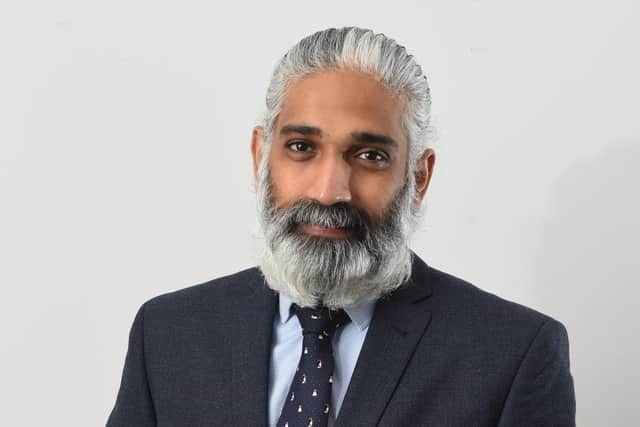

Advertisement
Hide AdAdvertisement
Hide Ad“They were truly frightening, [making] you think: ‘That can’t be right’. The possible worst case scenario was terrible.
“There were also challenges within the system - things you thought might exist, like PPE and access to ventilators, [were insufficient].
“Whatever plans you’ve got [in these situations], you think it’ll be alright. But there was just a dawning realisation that it’s not going to be alright and we have to do something different,” Gary recalls.
Those internal projections - which provoke such a chilling recollection amongst those who saw them - were never made public. However, they can perhaps best be set in context by the fact that the actual number of Lancashire residents who have so far lost their lives within 28 days of a positive Covid test is shocking enough in itself - having exceeded the 2,000 mark earlier this month.
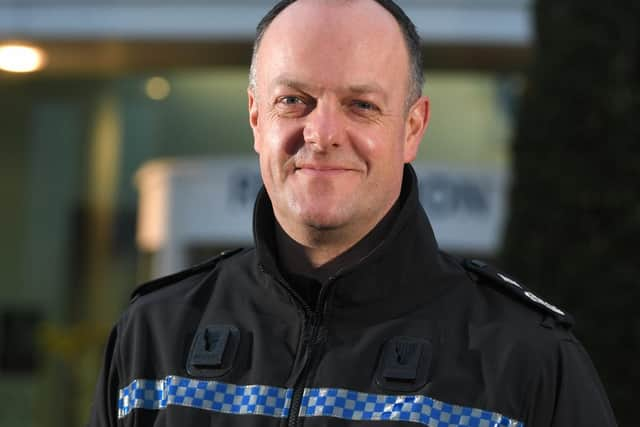

Advertisement
Hide AdAdvertisement
Hide AdBack in March, Terry Woods warned that thousands would die unnecessarily in the county if people did not stick to the rules of the first full lockdown - and a temporary morgue was set up in Fylde to increase the county’s mortuary capacity by 1,000.
That it was thankfully not needed does not alter the fact that several districts in the county - including Preston - spent several weeks in late summer and early autumn in the top ten worst-hit areas of England, as rates began to rise after earlier restrictions were relaxed.
According to Angie Ridgwell, there was a degree of grim inevitability to that, because of the challenges posed by Lancashire’s demographic landscape.
“The socioeconomics of some of our areas dictate [the high case numbers] - so unless we locked everyone up and didn’t let them go anywhere, we were always going to fight that battle with the rates in some areas,” Angie explains.
Advertisement
Hide AdAdvertisement
Hide AdIn his pivotal public health role, Dr. Sakthi has continually monitored the level of infection in different parts of the county - and he, too, has long recognised the importance of issues such as deprivation in determining susceptibility to Covid.
As an understanding of case rates gradually seeped into the public consciousness, it was he who wrestled with their real-world implications.
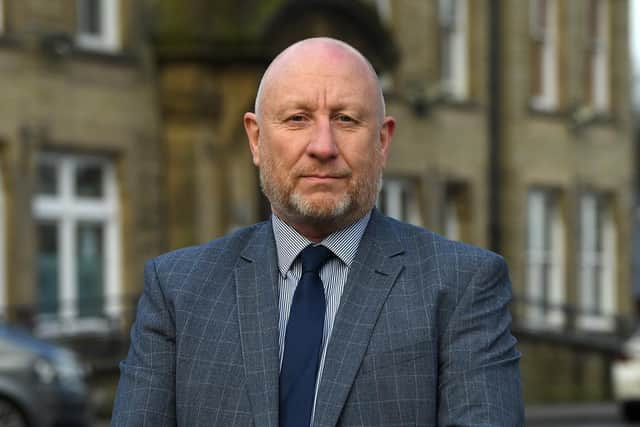

That meant making judgement calls on everything from the post-lockdown reopening of schools - Lancashire’s were recommended to remain closed three weeks longer than the government suggested - to the thorny issue of local Covid restrictions. While the latter were ultimately determined by the government, it was the advice of the director of public health which usually informed the lobbying position taken by the county’s politicians.
Although himself above the political fray, that put Dr. Sakthi in the thick of the saga that led to Lancashire being placed under Tier 3 restrictions in October, against the will of many local leaders.
Advertisement
Hide AdAdvertisement
Hide AdHe is candid about often feeling as though there “wasn’t any straightforward answer” to the conundrums he was trying to crunch.
“Many times it was like flying through fog - you are operating the levers, but you don’t know where the landing strip is. People look to you as if you have solutions, but I’ve been working on the edge of my experience.
“You look to other people to put the jigsaw together and have a shared understanding,” Dr. Sakthi added.
The importance of Lancashire’s collective deliberations were laid bare to him during the early days of the outbreak.
Advertisement
Hide AdAdvertisement
Hide Ad“Usually with any pandemic - like flu or SARS - it doesn’t much touch the frontline care workers. But early on, one of my friend’s wives was on a ventilator for six or seven weeks.
“That's when it was really very close [and you realise] that you're dealing with your mates that are on the frontline.”
Meanwhile, local authorities were left to distribute life’s essentials to some of Lancashire’s most vulnerable - faced with the challenge of setting up community hubs, both to support those being advised to shield and also others who risked being pushed into penury by the pandemic.
Additionally, they were at the forefront of a scramble to secure scarce PPE and, by the summer, councils like Preston and Pendle were also getting to grips with the demands of operating local test sites after a call for asymptomatic Covid testing capacity was briefly answered by the government.
Advertisement
Hide AdAdvertisement
Hide AdGary Hall believes that Lancashire’s local authorities rose to the occasion - and the only people who will have been surprised by that fact are those who underestimated them in the first place.
“People think we just empty the bins and cut the grass. Supporting communities, knowing [them] and being able to mobilise in an emergency [is something] we do regularly, it’s bread and butter to us.
“And the staff have been absolutely fantastic - they haven’t complained when we have asked them to do anything outside the norm. You see the best of people.”
For Terry Woods, there are two crucial elements to what he considers the success of Lancashire’s Covid response - the “silent majority”, who abided by the ever-shifting rules, and the emergency structures that were already in place in the county and had regularly been tested by incidents such as flooding.
Advertisement
Hide AdAdvertisement
Hide Ad“We called a Gold meeting much earlier than any other county, I’d suggest. I think we were one of the very few where every single chief exec from every local authority [attended] - and there is a real strength in that bond.
“The command and control framework that you wrap around any major incident is really useful and, combined with people’s breadth of experience, [that ensured] we were all in each other’s safe hands.
“Although I’m not saying it was all calm,” he adds, to knowing smiles from his LRF colleagues.
Angie Ridgwell says that the split between county, district and standalone councils in Lancashire did present some of its traditional challenges, but ultimately all 15 local authorities worked together for Lancashire as a whole.
Advertisement
Hide AdAdvertisement
Hide AdShe also recalls how councils often discovered what was to be expected of them the next day at the same time as the rest of the nation during the daily Downing Street briefings.
“There wasn’t so much a national strategy as policy by announcement...but [locally] we were very in control of how we deployed our resources in that context and I do think that has had a positive result for the people of Lancashire.”
Gary Hall adds: “We could never quantify it, but some of the things we have done have probably saved people’s lives.
“We weren’t going to rely on anybody else - we had to sort it out and I think, in the main, that’s what we did.”
Advertisement
Hide AdAdvertisement
Hide AdAs the pandemic developed, the LRF began to deploy a catchphrase in its communications with the public, as locals were encouraged to “Do it for Lancashire”.
It now seems obvious where the concept originated - the belief amongst the group's leaders that they themselves had been guided by the same principle since that now distant day one.
PPE: HOW LANCASHIRE MADE IT HAPPEN
Like the rest of the UK, Lancashire was faced with severe shortages of personal protective equipment (PPE) for its care sector as the pandemic struck.
The way in which the problem manifested itself is etched onto the memory of Lancashire Constabulary’s Deputy Chief Constable Terry Woods.
Advertisement
Hide AdAdvertisement
Hide Ad“We started to get a stream of desperate calls from care homes - people breaking down on the phone saying that they didn't have enough PPE.
“That’s when you start to think that this is completely different. It’s the human side of the pandemic that I think has motivated [us all] - those real-life stories [which make] you think that you need to be rapid and get things sorted.”
The developing crisis gave rise to an approach of “asking for forgiveness, not permission” in doing whatever it took to acquire vital supplies.
That saw Lancashire look to the Far East to see what it could lay its hands on. As the Local Democracy Reporting Service reported at the time, the county secured several shipments of the sought-after kit in a multi-million pound deal which saw the life-saving products land just in time to meet the demand at the peak of the first wave.
Advertisement
Hide AdAdvertisement
Hide AdHowever, Terry Woods has now revealed just how Lancashire managed to achieve the seemingly impossible.
“We have big manufacturing [companies] in East Lancashire, who have got contacts abroad. The chief executive of Burnley Council [was] helping that conversation and the idea [came from] the chief executive at Lancaster City Council, who was [in charge of] logistics,” he explains.
“Would you ever have [usually] got the public sector buying millions of pounds worth of PPE direct from manufacturers in China?
“You just wouldn't, because it’s not conventional - but we weren’t dealing with convention and it just shows you the richness of Lancashire.
Advertisement
Hide AdAdvertisement
Hide Ad“I think we’ll all sleep [well] knowing that those care homes got the PPE they needed a lot quicker than anywhere else in the country.”
During the peak period for PPE shortages up to 1st July, the county council issued 3.2m pieces of kit to the social care sector, responding to an average of 35 appeals per day from those in need of supplies. More than half of the deliveries were made on the same day that they were requested and 95 percent within two days.
POST-PANDEMIC RETHINK
Lancashire County Council chief executive Angie Ridgwell marvels at some of the efforts she has witnessed during the response to the pandemic - “from individuals, communities and whole organisations”.
However, while she has been uplifted by Lancashire’s sense of community spirit, she believes that the Covid crisis has also shone a light on something of which the county and the country should be far less proud.
Advertisement
Hide AdAdvertisement
Hide Ad“The people we most relied on to keep us safe during this process were, generally speaking, the lower paid - the retail workers, truck drivers, bus drivers, carers and health [workers].
“They just do not get enough recognition and we need to step back as a country and really think about what we value.
“I’ve been really struck that those people who have put their lives at risk the most are those that are paid the least - and why should they have to do that?” she asks.
Dr. Sakthi believes that there should be a similar re-evaluation of the role of public health when the current crisis finally passes.
Advertisement
Hide AdAdvertisement
Hide Ad“It is generally an afterthought, it's not sexy, it's not in the front of the minds [of policymakers]. I feel that the last year has really brought to the fore the importance of public health as a discipline and how broad a spectrum it is,” he adds.
REFLECTIONS ON A PANDEMIC
Like the rest of society, those leading Lancashire’s Covid response wish that the crisis had never been visited upon us. However, none of them would want to have been spared their own part in attempting to mitigate its worst effects.
Dr. Sakthi Karunanithi
“What chances are there from my personal perspective that someone born in India and who went to medical school there is here in Lancashire [during the pandemic], feeling responsible for one and a half million people? I feel so privileged and grateful to be able to serve and I’d like to say a big thank you to the people of Lancashire - they have made me feel really welcome.”
Deputy Chief Constable Terry Woods, Lancashire Resilience Forum, Gold Command (until June 2020)
Advertisement
Hide AdAdvertisement
Hide Ad“On a professional level, I don’t think I’ve ever had a bigger challenge - and I feel a sense of purpose. When I draw my last breath [and think about] Covid and the partnership involvement, I’ll have no regrets and I'll be content with the sense of pride in trying to help people.”
Angie Ridgwell, Lancashire Resilience Forum, Gold Command (from June 2020)
“I won’t say I haven't had the odd sleepless night - sometimes because there is a lot to do and others because there is a really knotty problem that doesn’t have pleasant solution, so you’ve just got to work it through and satisfy yourself that whatever decision you're coming to, it’s in the best interest of the people of Lancashire.”
Gary Hall, Lancashire Resilience Forum, Silver Command
“As a senior person in public service, you want challenges - you wouldn’t have wanted it to be this challenge, of course - but that’s what you’re trained in and have experience in. It tests your own personal qualities - and it’s gratifying [to be] a part of it.”